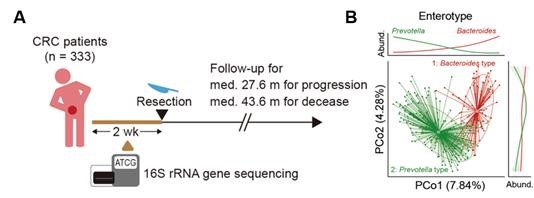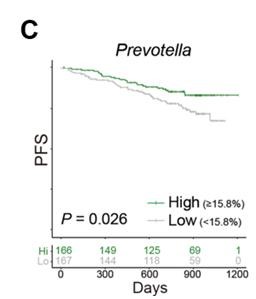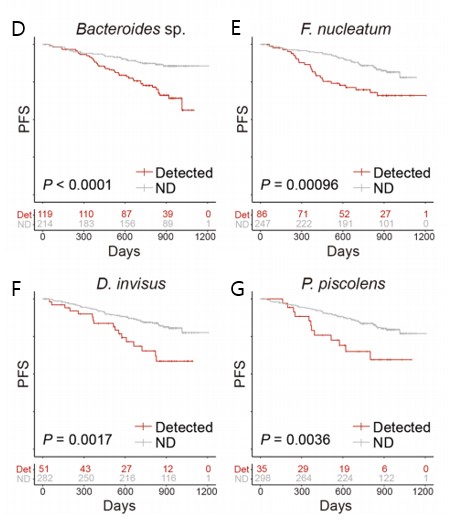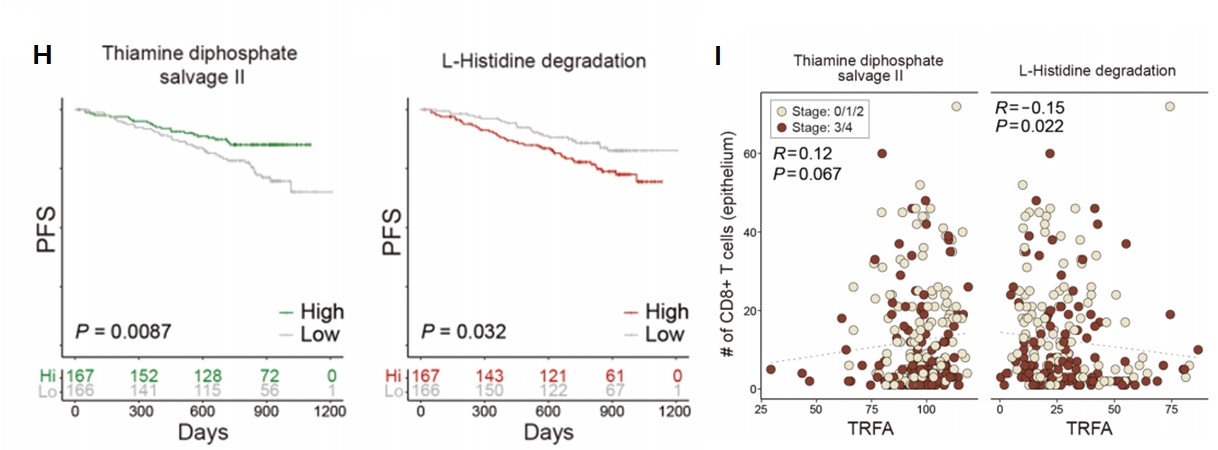The more 'Prevotella' present in the feces, the more positive prognosis of colorectal cancer
- Prognosis of colorectal cancer using intestinal microbes.. Possibility of customized treatment for colorectal cancer and prevention of recurrence
- Develop new biomarkers by combining discovered microorganisms... Better predictive power than existing clinical indicators
The fact that the prognosis of colorectal cancer can be predicted using intestinal microbes present in preoperative stool sample has been revealed by a Korean research team for the first time. This is expected to increase the possibility of customized treatment for colorectal cancer and prevention of recurrence in the future.
The joint research team of SNUH Prof Park Ji Won and Yonsei University Prof Kim Jihyun & PhD student Mr Huh Ji-Won published the results that using extensive screening based on next-generation gene sequencing and bioinformatics technology on 333 patients who underwent primary tumor resection for colorectal cancer, analyzing the association between cancer and gut microbes.
Colorectal cancer is the third most common cancer worldwide and has the second highest mortality rate. Therefore, it is very important to predict the prognosis in advance because cancer often recurs or progresses after colectomy.
However, to date, broad-spectrum microbial biomarker screening for colorectal cancer prognosis has not been successful.
Accordingly, the research team collected stool samples from 333 colorectal cancer patients within two weeks before surgery and performed next-generation gene sequencing to search for strains that can predict the prognosis of colorectal cancer in the gut microbiota of colorectal cancer patients. After that, the colorectal cancer progression and reduction after surgery were followed up for about 3 years. The two representative phenotypes of human intestinal microbes were divided into Bacteroides type and Prevotella type.

A. 16S rRNA gene sequencing and follow-up of feces from 333 colorectal cancer patients before surgery.
B. Phenotype of the gut microbiome. It is divided into Bacteroides and Prevotella types.
As a result of the study, it was found that the higher the amount of Prevotella, a representative intestinal microorganism, the better the prognosis of colorectal cancer. The group with a high dose of Prevotella had significantly higher progression-free survival (PFS) than the group with a low dose (p=0.026).
In particular, in the case of Prevotella, it is a common microorganism in Asian countries where many dishes revolve around vegetables. The research results can be scientific evidence supporting the positive association between vegetarianism and colorectal cancer prognosis.

C. Progression-free survival rate (PFS) of colorectal cancer according to the amount of Prevotella.
On the other hand, it was confirmed that colorectal cancer prognosis deteriorated when Fusobacterium nucleatum, a representative pathogenic microorganism, and three new microorganisms (ΔAlistipes sp., △Dialister invisus, and △Pyramidobacter piscolens) were present.

D-G. Colorectal cancer progression-free survival (PFS) trends according to four microorganisms.
In addition, the research team developed a new prognostic biomarker for gut microbes by combining the five prognostic biomarker microorganisms discovered during the research process. This biomarker showed better predictive power when compared to several previously used clinical indicators. In particular, it was confirmed that when the intestinal microbial biomarker was added to the cancer stage, which is the most representative colorectal cancer prognostic factor, the prognosis predictive power was significantly improved.
In addition, the research team also analyzed to infer the metabolic system of intestinal microorganisms based on the reference microbial genome. During the analysis, it was found that the production of vitamin B1 (Thiamine) by microorganisms can improve the prognosis of colorectal cancer and shows a high positive correlation with the number of apoptotic immune cells (CD8+ T cells) in the intestine.

H. Metabolic pathways of new intestinal microorganisms (Thiamine, L-histidine) related to colorectal cancer prognosis and progression-free survival rate.
I. Correlation between novel microbial-based biomarkers and apoptotic CD8+ T cells in the epithelial layer of the colon.
Previous prognostic studies using microorganisms were limited to a couple of small microorganisms. However, this study is significant in that it made it possible to predict the customized prognosis of colorectal cancer patients in a non-invasive way while also additionally considering four new microorganisms.
Prof Park Ji Won (SNUH, Division of Colorectal Surgery) said, “At a time when the importance of gut microbes in various diseases is being revealed, this study is meaningful in that it suggests that gut microbes can also be used to predict the prognosis of colorectal cancer. ” Then he added, “The results of this study are expected to serve as the basis for customized treatment for colorectal cancer using gut microbes in the future.”
Prof Kim Jihyun (Yonsei University, Department of system biology) said, "Through further research on gut microbes that can be used for colorectal cancer prognosis, the possibility of using microbes to improve colorectal cancer prognosis and prevent recurrence has opened up." He also added, “As a follow-up to this study, a study will be conducted to identify the effects of diet and gut microbial metabolism on colorectal cancer prognosis, and their relationship.”
This research was supported by the Korea Cancer Research Foundation, the National Research Foundation of Korea (Bio/medical technology development project, multi-ministerial national life research resource advancement project), and the Yonsei Signature Research Cluster Project. The research result was published online on November 28 in the prestigious international journal Microbiome (2021 JCR IF = 16.837) in the field of microbiology research.

[Pictures from the left] SNUH Division of Colorectal Surgery, Prof Park Ji Won and Yonsei University Department of system biology Prof Kim Jihyun & PhD student Mr Huh Ji-Won.